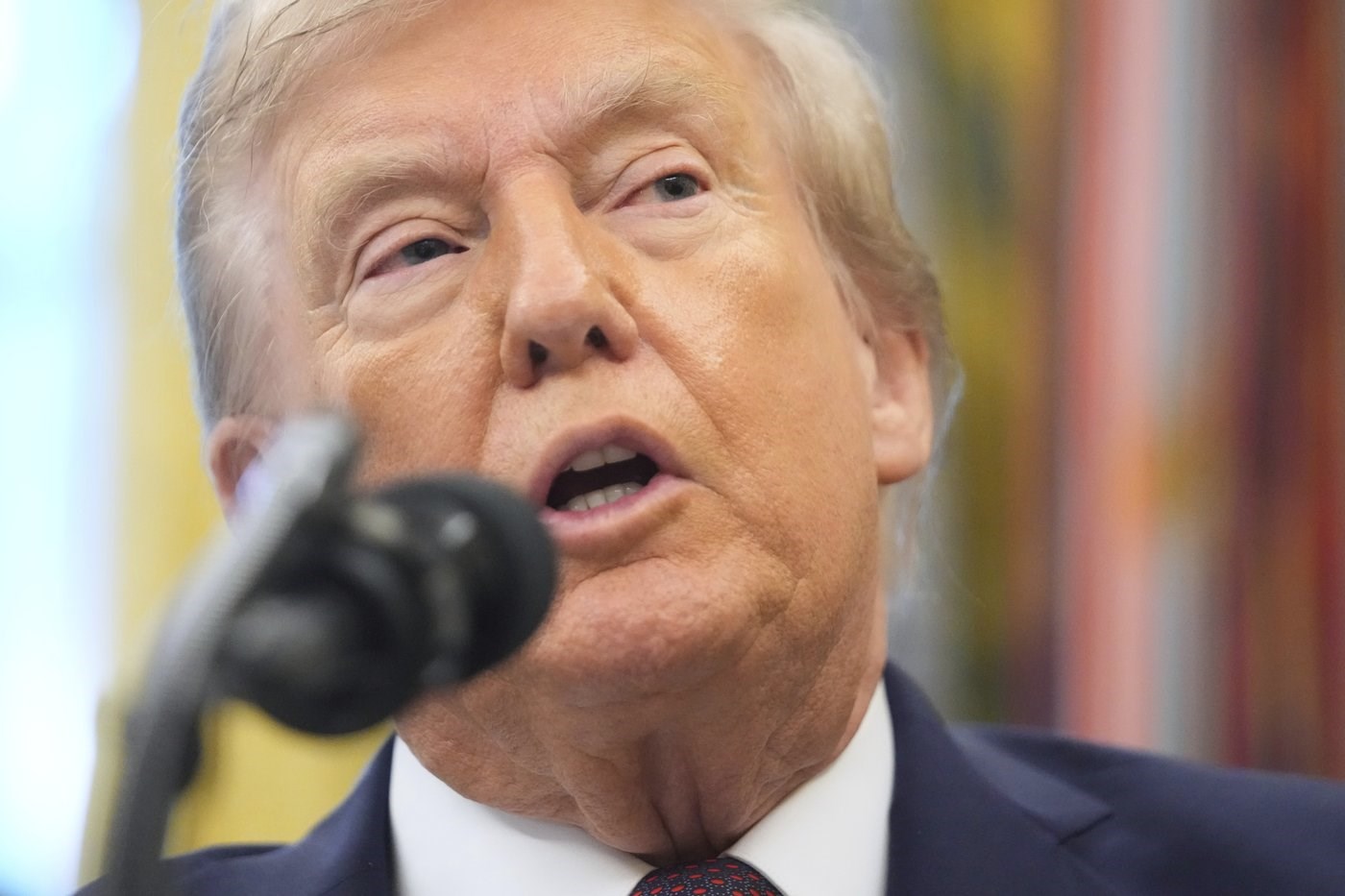Aamer Madhani, Konstantin Toropin And Regina Garcia Cano

President Donald Trump speaks during an event about the relocation of U.S. Space Command headquarters from Colorado to Alabama in the Oval Office of the White House, Tuesday, Sept. 2, 2025, in Washington. (AP Photo/Mark Schiefelbein)
Republished September 02, 2025 - 4:47 PM
Original Publication Date September 02, 2025 - 12:31 PM
WASHINGTON (AP) — President Donald Trump said Tuesday the U.S. has carried out a strike in the southern Caribbean against a drug-carrying vessel that departed from Venezuela and was operated by the Tren de Aragua gang.
The president said in a social media posting that 11 people were killed in the rare U.S. military operation in the Americas, a dramatic escalation in the Republican administration's effort to stem the flow of narcotics from Latin America. Trump also posted a short video clip of a small vessel appearing to explode in flames.
“The strike occurred while the terrorists were at sea in International waters transporting illegal narcotics, heading to the United States,” Trump said on Truth Social. “No U.S. Forces were harmed in this strike. Please let this serve as notice to anybody even thinking about bringing drugs into the United States of America.”
The video appears to show a long, multi-engine speedboat traveling at sea when a bright flash of light bursts over the craft. The boat is then briefly seen covered in flames.
The video, which is largely in black and white, is not clear enough to see if the craft is carrying as many as 11 people. The video also did not show any large or clear stashes of drugs inside the boat.
Tren de Aragua originated more than a decade ago at an infamously lawless prison with hardened criminals in Venezuela’s central state of Aragua. The gang has expanded in recent years as more than 7.7 million Venezuelans fled economic turmoil and migrated to other Latin American countries or the U.S.
Trump and administration officials have repeatedly blamed the gang for being at the root of the violence and illicit drug dealing that plague some cities. And the president on Tuesday repeated his claim — contradicted by a declassified U.S. intelligence assessment — that Tren de Aragua is operating under Venezuelan President Nicolás Maduro's control.
The White House did not immediately explain how the military determined that those aboard the vessel were Tren de Aragua members. The size of the gang is unclear, as is the extent to which its actions are coordinated across state lines and national borders.
What Maduro had to say
After Trump announced the strike, Venezuelan state television showed Maduro and first lady Cilia Flores walking the streets of his childhood neighborhood. A television presenter said Maduro was “bathing in patriotic love” as he interacted with supporters.
“In the face of imperialist threats, God (is) with us,” Maduro told supporters.
Maduro did not address the strike directly, but charged that the U.S. is “coming for Venezuela’s riches,” including oil and gas. The South American country has the world’s largest proven oil reserves.
“From the neighborhoods of Caracas ... I tell you, there will be peace in Venezuela, with sovereignty,” he said.
Trump and Secretary of State Marco Rubio first announced the strike earlier Tuesday, shortly before Rubio left on a trip to Mexico and Ecuador for talks on drug cartels, security, tariffs and more.
In a brief exchange with reporters before departing Miami for Mexico City, Rubio deferred questions about the specifics of the strike to the Pentagon. He said the drugs on the vessel were likely headed to Trinidad or elsewhere in the Caribbean.
For years, Rubio has spoken out against Maduro and other Latin American leftist governments and supported opposition leaders. In 2018, during Trump’s first term, Rubio told Univision there was a “strong argument” to be made for the use of the U.S. military in Venezuela. He's also accused Venezuelan officials of aiding drug traffickers.
Asked if Trump would carry out operations on Venezuelan soil, Rubio was opaque. “We’re going to take on drug cartels wherever they are and wherever they’re operating against the interests of the United States,” he said.
US sent destroyers to waters off Venezuela
The operation came after the U.S. announced plans last month to boost its maritime force in the waters off Venezuela to combat threats from Latin American drug cartels.
Maduro's government has responded by deploying troops along Venezuela's coast and border with neighboring Colombia, as well as by urging Venezuelans to enlist in a civilian militia.
Maduro has insisted that the U.S. is building a false drug-trafficking narrative to try to force him out of office. He and other government officials have repeatedly cited a United Nations report that they say shows traffickers attempt to move only 5% of the cocaine produced in Colombia through Venezuela. Landlocked Bolivia and Colombia, with access to the Pacific and Caribbean, are the world’s top cocaine producers.
The latest U.N. World Drug Report shows that various countries in South America, including Colombia, Ecuador and Peru, reported larger cocaine seizures in 2022 than in 2021, but it does not assign Venezuela the outsize role that the White House has in recent months.
“The impact of increased cocaine trafficking has been felt in Ecuador in particular, which has seen a wave of lethal violence in recent years linked to both local and transnational crime groups, most notably from Mexico and the Balkan countries,” according to the report.
Maduro on Monday told reporters he “would constitutionally declare a republic in arms” if his country were attacked by U.S. forces deployed to the Caribbean.
___
Garcia Cano reported from Mexico City. AP journalists Matthew Lee in Mexico City, Adriana Gomez Licon in Ft. Lauderdale, Florida, and Sagar Meghani in Washington contributed reporting.
News from © The Associated Press, 2025